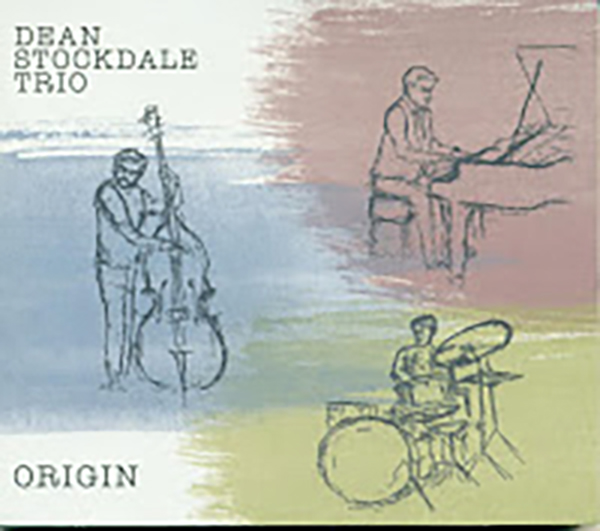
by Ian Mann
October 26, 2017
/ ALBUM
The original writing is consistently engaging and the playing, by a very well balanced and democratic trio, uniformly excellent. A good calling card for Stockdale's capabilities.
Dean Stockdale Trio
“Origin”
(Self Released)
Originally from the North East of England Dean Stockdale is a pianist, composer and educator now based in the Manchester area. A highly versatile musician he performs in both jazz and classical contexts and also undertakes theatre work.
As a jazz pianist Stockdale cites Oscar Peterson as a key influence and has performed Peterson themed shows. Most of his performances take place in the North of England and he is a musician with a strong regional reputation. Among those with whom he has collaborated are vocalists Zoe Gilby and Ruth Lambert, saxophonists Martin Speake, Tommaso Starace and Dave O’Higgins, trumpeter Noel Dennis and fellow pianist Dave Newton, with whom he has performed in a duo format.
I’m grateful to Dean for forwarding me a review copy of this CD. I suspect that this in the wake of my recent favourable review for the album “The Family Tree” by the bassist on this recording Gavin Barras. My review of “The Family Tree” can be read here;
http://www.thejazzmann.com/reviews/review/gavin-barras-the-family-tree/
Joining Stockdale and Barras on “Origin”, which was released earlier in 2017, is Adam Dawson, a prolific sideman and session musician as both a drummer and percussionist, and the leader of his own jazz quartet, also featuring Stockdale.
Dawson concentrates on kit drums throughout “Origin” which consists of seven original compositions by Stockdale plus arrangements of “Nostalgia In Times Square” by Charles Mingus and “Out Of Nowhere” by Sammy Fain.
It’s the Mingus piece that opens the album, a gently swinging version that emphasises the composer’s gift for melody while allowing Stockdale to stretch out expansively above the subtly propulsive bass and drum grooves generated by Barras and Dawson. Barras also enjoys a brief spell in the limelight with a succinct but resonant bass solo.
Stockdale’s own “Harbour Lights” is an evocative and descriptive composition which emphasises Stockdale’s own melodic gifts. More contemporary and European in feel it’s a charming piece with the focus on beauty and simplicity. It’s a lovely piece that demonstrates Stockdale’s way with a tune and possesses a subtle gospel tinge that is reminiscent of Keith Jarrett at his most accessible.
There’s also a strong sense of place about “New York By Night” which embraces a more urgent, urban vibe while swinging impressively courtesy of Barras’ confident bass walk and Dawson’s clipped, increasingly busy drum grooves. Stockdale stretches out and solos with great fluency, his playing embracing blues and gospel influences with a vague tip of the hat towards Thelonious Monk. Barras weighs in with a muscular but melodic bass solo.
Stockdale’s “Another Time” is a true ballad with the composer’s lush, lyrical pianism underscored by Barras’ languid bass purr and Dawson’s subtly brushed accompaniment. Barras’ double bass solo again emphasises both the melodiousness and resonance of his playing.
Sammy Fain’s “Out Of Nowhere” is bright and playful with Stockdale’s darting phrases shadowed by Dawson’s busily brushed drums and punctuated by Barras’ bass in a captivating series of opening exchanges. Later the piece adopts a fierce swing with Stockdale’s mercurial keyboard runs underscored by rapid bass and busy drums, the cymbals ticking like Swiss clock mechanisms. Barras’ bass assumes the lead for an exuberant solo as Dawson’s brushes chatter around him and the drummer subsequently gets to enjoy his own feature.
There’s no let up in the energy levels on Stockdale’s own “Railtown” which is introduced by the pumping of Barras’ bass and continues full steam ahead as Stockdale and Dawson enter the fray on this highly rhythmic piece. The busy, insistent bass and drums provide the impetus for Stockdale’s lively, leaping, vaulting solo as this most cohesive of trios continues to delight in its joyous music making.
The pot keeps bubbling on Stockdale’s engaging, Monk-like original “Nth Degree”, a piece that demonstrates just how in-sync this well calibrated trio is. Barras and Dawson generate a busy, but highly propulsive, rhythmic drive that fuels Stockdale’s joyous soloing with the bassist stepping forward himself towards the end of the tune.
“Pike’s Place” explores broadly similar territory and is another splendidly swinging piece featuring lively exchanges between piano bass and drums with both Barras and Dawson enjoying substantial individual features.
The album closes on a gentler note with Stockdale’s “Metropoilitan Nocturne”, a brief, lyrical solo piano piece that cools the fires and serves as a reminder of the composer’s classical influences and abilities.
Although arguably a little derivative at times “Origin” is an excellent calling card for Stockdale’s capabilities as both a pianist and a composer. The original writing is consistently engaging and the playing, by a very well balanced and democratic trio, uniformly excellent.
On the evidence of this recording the Stockdale trio is a unit that I’d very much like to see playing live. Unfortunately the pianist rarely seems to venture very far south of the M62, but hopefully this album will bring his music to the attention of a wider, national audience.
blog comments powered by Disqus